

'I call my OCD Olivia' What it’s really like living with OCD: “I’m obsessed with the harm I could cause” I realised that I couldn’t cope with OCD anymore shortly after my 30th birthday.
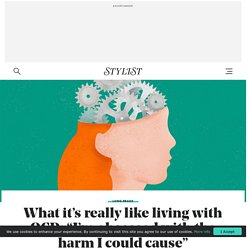
Paul was working abroad, my dad had been diagnosed with cancer, my job was extremely busy and everything felt out of control. I know now that loss of control and stress are major triggering factors for me. Is everything you think you know about depression wrong? In the 1970s, a truth was accidentally discovered about depression – one that was quickly swept aside, because its implications were too inconvenient, and too explosive.

American psychiatrists had produced a book that would lay out, in detail, all the symptoms of different mental illnesses, so they could be identified and treated in the same way across the United States. It was called the Diagnostic and Statistical Manual. In the latest edition, they laid out nine symptoms that a patient has to show to be diagnosed with depression – like, for example, decreased interest in pleasure or persistent low mood. For a doctor to conclude you were depressed, you had to show five of these symptoms over several weeks. Brain scan study provides new clues as to how electroconvulsive “shock” therapy helps alleviate depression. By Christian Jarrett In the UK, thousands of people with depression continue to undergo electroconvulsive “shock” therapy (ECT) each year, usually if their symptoms have not improved following talking therapy or anti-depressants, and especially if they are considered to be at high risk of suicide, and the numbers may be rising.
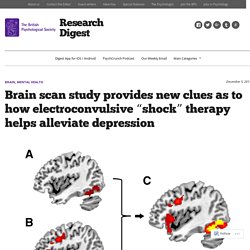
The technique, which involves using an electric shock to induce a seizure, carries risks, such as memory problems, but the majority of patients experience symptom improvements, and patient surveys show they generally view it positively. Four brain genes help explain obsessive compulsive disorder. Jeffrey Hamilton/Getty By Alice Klein Four genes have been identified that are linked to obsessive compulsive disorder (OCD).
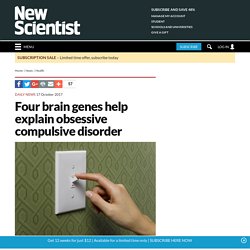
The genes all play a role in the same brain circuit, and may help explain why people are more likely to have OCD if they have a relative with the condition. People with OCD have intrusive thoughts and feel driven to repeat rituals, such as handwashing, to relieve their anxiety. Chris Kirkland: ‘I didn’t want to wake up in the morning. It just starts again’ Pathology in the Hundred Acre Wood: a neurodevelopmental perspective on A.A. Milne. Eye study for obsessive-compulsive disorder at University of Aberdeen. Image copyright Science Photo Library A new test aimed at diagnosing obsessive-compulsive disorder based on eye movement is being researched at the University of Aberdeen.
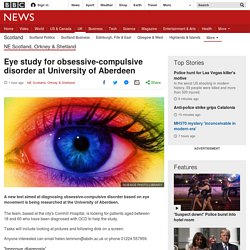
The team, based at the city's Cornhill Hospital, is looking for patients aged between 18 and 60 who have been diagnosed with OCD to help the study. Tasks will include looking at pictures and following dots on a screen. Anyone interested can email helen.lemmon@abdn.ac.uk or phone 01224 557959. Google will ask: 'Are you depressed?' Image copyright Google.
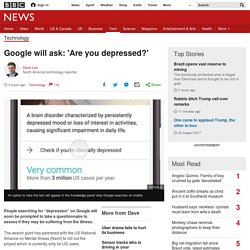
Cat 653. Debunking the myths of OCD - Natascha M. Santos. OCD: The War Inside. Extreme OCD Camp Episode 1 BBC documentary 2013 journey to the American wilderness. Living With #OCD. Celine's depression: 'My selfies tell a story' Image copyright CELINE BALLANTINE Celine is a 19-year-old law student at the University of Hull who has suffered with depression and anxiety for much of her life.
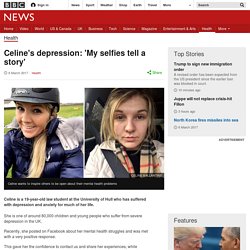
She is one of around 80,000 children and young people who suffer from severe depression in the UK. Recently, she posted on Facebook about her mental health struggles and was met with a very positive response. This gave her the confidence to contact us and share her experiences, while receiving treatment at Cygnet Hospital Harrogate. More than anything, she wants to inspire others to be open about their mental health. This is her story. Image copyright Celine Ballantine. Emetophobia: 'I'm terrified of vomiting - chicken scares me' Image copyright Hannah Ellis.
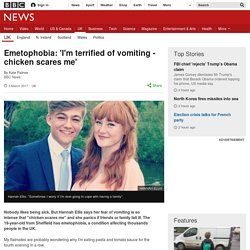
Is positive thinking making us depressed? Spider phobia brain 'processes unconscious fear' Image copyright Science Photo Library Showing arachnopohobes images of spiders so briefly they remain unaware of them could help them overcome their fear, US researchers suggest.
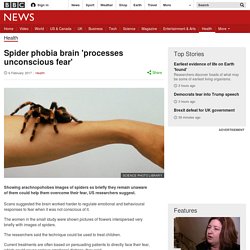
Scans suggested the brain worked harder to regulate emotional and behavioural responses to fear when it was not conscious of it. The women in the small study were shown pictures of flowers interspersed very briefly with images of spiders. The researchers said the technique could be used to treat children. Current treatments are often based on persuading patients to directly face their fear, which could cause serious emotional distress, they said. A phobia is an irrational fear of an object, place, situation, feeling or animal. It is possible to find happiness again after major depression. Living through depression can feel like being in an emotional prison, but there is a way out, at least for some.
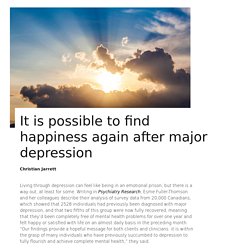
Writing in Psychiatry Research, Esme Fuller-Thomson and her colleagues describe their analysis of survey data from 20,000 Canadians, which showed that 2528 individuals had previously been diagnosed with major depression, and that two fifths of this group were now fully recovered, meaning that they’d been completely free of mental health problems for over one year and felt happy or satisfied with life on an almost daily basis in the preceding month. “Our findings provide a hopeful message for both clients and clinicians: it is within the grasp of many individuals who have previously succumbed to depression to fully flourish and achieve complete mental health,” they said.
A fear of feeling guilty might be key to some forms of OCD. There's increasing recognition that our vulnerability to mental health problems isn’t just about how much we are prone to certain emotions such as anxiety and low mood, but also how we relate to those emotions. The Truth about Depression BBC Full Documentary 2013 YouTube. Conquering depression. The mindful way through depression: Zindel Segal at TEDxUTSC. Analysis of a five year old boy Freud. Systematic Desensitisation - Capafons. Shiny ‘app-y people: Treating depression from your smart phone. Earlier this year I wrote about some research I was involved in, which reduced aggressive behaviour in young offenders by manipulating their perception of ambiguous facial expressions.
A similar principle is behind a new app, called HappyPlace, which has been developed as an attempt to combat low mood (full disclosure: this is the same group as the above research, and so conducted in the lab where I work). Past research has suggested that depression may be partly caused or maintained by biased ways of thinking, particularly around the processing of ambiguous faces. Consider walking down the street, and seeing a friend. Hanging out with virtual reality spiders helps arachnophobes see real spiders as smaller and less scary.